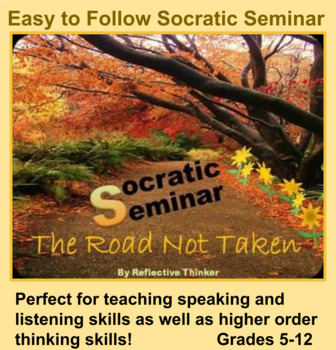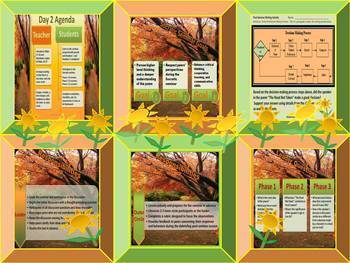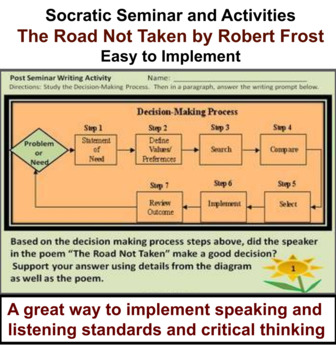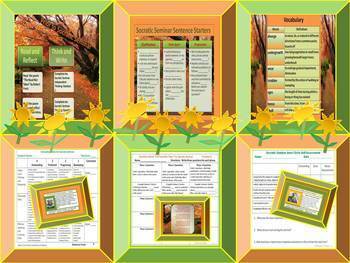Socratic Seminar: The Road Not Taken by Robert Frost, Standards Aligned
- PPTX
What educators are saying
Description
This Socratic seminar contains a great message for the beginning of the school year! Socratic seminar is an excellent and engaging way for students to practice higher order thinking skills. Introduce your students to Socratic seminar with this easy-to-implement, step-by-step resource. This 32-slide PowerPoint resource with printables is a Socratic seminar to include pre and post activities featuring the poem “A Road Not Taken” by Robert Frost. This resource includes a well-organized protocol for conducting a formal discussion or Socratic seminar based on Frost’s poem. This easy-to-implement Socratic seminar could be used in a staff development to show staff how to implement Socratic Seminar in their classrooms.
On Day 1 students complete two activities designed to help them engage in an effective seminar. On Day 2, the students engage in a formal discussion of the poem. The student leader asks open-ended questions while the inner circle participants listen closely to the comments of their peers, think critically for themselves, and articulate their own thoughts and responses to the thoughts of others. Students chosen for the outer circle observe the inner circle participants or leader using rubrics designed to focus the observations. All students practice 21st century skills as they learn to work cooperatively and to question intelligently and civilly. On Day 3, students complete reflections and writing assignments related to the seminar topics and Frost’s poem. The resource is appropriate for middle school, high school, and adult learners. The activities, most likely, will span 3-5 days.
All of the following are included in this resource:
*Common Core Standards for Reading, Writing, Speaking and Listening
*Teacher Preparation Slides for Days 1-3
*Day 1 Agenda, Day 2 Agenda, Day 3 Agenda
*Socrates Background Information
*Robert Frost Background Information
*Socratic Seminar Goals
*Socratic Seminar Norms
*Pre-Seminar Information
*“The Road Not Taken” by Robert Frost
*Pre-Seminar Independent Thinking Printable
*Pre-Seminar Critical Thinking Questions Printable
*Room Arrangement Options
*Vocabulary in “The Road Not Taken”
*Leader Responsibilities
*Time Keeper Responsibilities
*Inner Circle Responsibilities
*Outer Circle Responsibilities
*Leader Questions for “The Road Not Taken”
*Socratic Seminar Sentence Starters
*Outer Circle Observation Checklist Printable
*Inner Circle Self-Assessment and Reflection Printable
*Observation of Leader Checklist Printable
*Teacher Evaluation of Seminar Option 1 Printable
*Teacher Evaluation of Seminar Option 2 Printable
*Decision Making Process Writing Assignment 1
*Road Less Traveled Writing Assignment 2
*Author’s Notes
5 Rubrics/Checklist/Self-Assessment/Peer-Assessment
A preview is available.
Social Studies Connection:
Decision making is a process that should be taught in all grades as many students have difficulty applying steps in the decision-making process. This resource helps teachers be more deliberate in teaching good decision making strategies. Students make connections between good decision making and Frost's poem through Socratic seminar. Included is a well-organized 32-slide protocol for conducting a seminar or discussion about good decision making and/or the poem's content.
Click here if you would like to visit my store to preview other products.
Click here if you would like to preview another Socratic seminar resource, If by Rudyard Kipling.
Earn credits by leaving feedback on this resource.
After using a resource, leave a rating and review by following these steps:
- Go to your "My Purchases" page and click the "Leave a review" button.
2. Answer each question and leave a review sharing more about your experience with the resource. Then, click "Done."
To redeem your credits, look for "Use Account Balance" located under the "Checkout" button in your cart. Enter the amount you'd like to apply toward your order, and click "Apply."
Keywords: A Road Not Taken; Robert Frost; close reading; Socratic seminar; Socratic method; collaborative learning; oral communication; rubrics
CCSS Aligned Socratic Seminar: The Road Not Taken by Robert Frost is licensed under a Creative Commons Attribution 4.0 International License.





